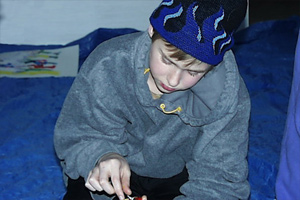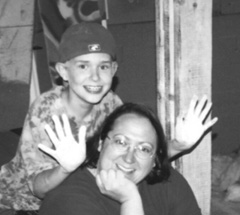
"By the time Nate's mother approached me, he had already spent three years in special ed. classes, and was performing at up to two years below his grade level in some subjects.
Nate, however, was a very bright child, with a superior IQ, and excellent reading and math skills. He had been placed in special education because of executive function / organizational difficulties, problems communicating in writing his thoughts clearly, etc., and ADHD.
I worked intensively with Nate and his mother over the course of several months to understand the intricacies of Nate's situation and his learning strengths and weaknesses.
One particularly disturbing aspect of Nate's situation was that the school had an antiquated attitude regarding special education and human dignity. Special education staff said extremely demeaning things to him, without corrective action from administration. Regular education and inclusion teachers ignored put-downs from fellow students in regular education classes.
Naturally confident and socially aware, Nate's self-esteem had suffered from being stereotyped as a 'SPED kid', affecting his relationships with his family, teachers, and other children. It was becoming clear that the special ed. classes were doing more harm than good to his progress, and that a fresh start, free of assumptions and preconceptions on both sides, would make a difference.
Recognizing the damage to Nate's self-image, and his academic progress, we (the family and I), tried an experiment. At an Individualized Education Plan (IEP) meeting at Nate's new school we advocated for him to be placed in regular classes, without special ed services; they agreed to put him on 'monitor' status for his first year, meaning that he would remain eligible for special ed. services should they be required.
At the same time, I used bi-weekly out-of-school (2hr.) sessions to educate Nate and his mother about the intricacies of his learning style, and what that means for him in a traditional learning environment. We developed strategies and compensation skills that enabled him to make progress outside of the special ed. Environment and in the regular education setting. I taught his mother behavior management skills to address Nate's problems with personal accountability, responsibility and organization skills (which we still struggle with). We also started replacing old tapes playing 'learned helplessness' mantras, with learned resilience behaviors and the confidence that they spawned.
Within the school system, our emphasis has been on finding ways for Nate to deal with the demands of organizing assignments and homework, and to organize his work schedule to maximize his time. We have had to create methods that suited his abilities, which enabled him to successfully complete multi-skilled projects that challenge, his abilities, disabilities, and learning style differences.
Since Nate is a very visual learner, we often used images to convey story, or time lines, before we wrote. Because he has a strong memory for details, and for figuring out how things fit together to create functional systems, used sketched images, or diagrams to recall details of how abstract ideas, or chronological events fit together. Nate is an extremely kinesthetic (movement oriented) learner; so, we used color-coded index cards to summarize concepts. We then worked on moving them around until they were able to convey the story to his reader.
 Nate's
learning disabilities, learning style differences and ADHD manifested
in his highly active body and mind. His attention can be fickle, when
he is not hyper-focused on skateboard tricks, or video games. We used
multi-tasking to harness and direct some of his energy. We kept track
of how long it took to do tasks, for future planning. He and I worked
in 10-minute segments, to make the intense new skills easier to digest
and integrate. Sometimes we worked standing up. Sometimes we did active
things in between segments. We kept a list of what we needed to get done
in order to complete our goal. After each break we wrote how long it took
and checked off each task as we finished it. Authentic achievement, real
skill building, and real self-esteem are the benefits of seeing progress.
The required frequent breaks, clear goals, and strategies that matched
his mind in order to accomplish all the little parts of the larger, "non-watered-down"
goal.
Nate's
learning disabilities, learning style differences and ADHD manifested
in his highly active body and mind. His attention can be fickle, when
he is not hyper-focused on skateboard tricks, or video games. We used
multi-tasking to harness and direct some of his energy. We kept track
of how long it took to do tasks, for future planning. He and I worked
in 10-minute segments, to make the intense new skills easier to digest
and integrate. Sometimes we worked standing up. Sometimes we did active
things in between segments. We kept a list of what we needed to get done
in order to complete our goal. After each break we wrote how long it took
and checked off each task as we finished it. Authentic achievement, real
skill building, and real self-esteem are the benefits of seeing progress.
The required frequent breaks, clear goals, and strategies that matched
his mind in order to accomplish all the little parts of the larger, "non-watered-down"
goal.
To emphasize and reinforce the role of parental learning and networking, I introduced Nate and his mother to children and parents in similar situations. This way, they have been able to share their experiences and compensation strategies, and take part in out-of-school and out-of- session group activities.
Often, the first step in restoring confidence comes from being in an environment of your peers, sharing challenges and achievements. By helping Nate and his mother, by showing them ways to invoke "Learned resilience," they are empowered beyond simply 'coping' with problems, but towards a higher goal: helping Nate adapt to the real world, and to its real expectations. He can go out and make someone else's real world a better, more compassionate place."
Next story:
Experiential Learning: molding experience into academic mastery
Back to 'For Parents' index
